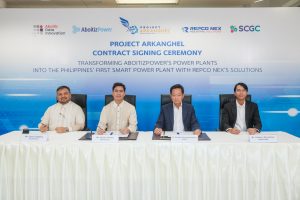
Aboitiz Power Corporation (AboitizPower) has partnered with Thailand-based company REPCO NEX Industrial Solutions (REPCO NEX) to introduce the Philippines’ first smart power plants.
Dubbed “Project Arkanghel”, the project will develop digital twins for AboitizPower’s existing circulating fluidized bed (CFB) coal-fired power plants; namely, the 300-megawatt Therma South Plant in Davao City and the 340-megawatt Therma Visayas Plant in Toledo City, Cebu. Both assets will serve as pioneer models for future installations in other thermal sites.
Digital twins are a virtual replica of a power plant that mimics its operational processes and systems, giving operators a tool that can simulate or stress-test scenarios, as well as detect faults and glitches earlier and in real time, all within a virtual environment.
With CFB technology already recirculating combustion for even greater power generation efficiency, digital twins will further optimize the performance of the power plants through data science and artificial intelligence (A.I.) that will empower operators and engineers to make more informed decisions.
In particular, as an integrated system, a digital-enabled power plant will streamline data collection and review for the benefit of asset health monitoring, life cycle management, and predictive maintenance. Proactive action spurred by these insights can result in lesser periods of planned and unplanned downtimes.
AboitizPower, Aboitiz Data Innovation, and REPCO NEX recently held the ceremonial signing of Project Arkanghel in Bangkok, Thailand, marking a significant milestone for the Aboitiz Group as it embarks on a journey of innovation and change that will transform the future of the Philippine energy landscape and even Southeast Asia.
“The energy landscape in the Philippines is constantly evolving on the path towards transition. Our economy continues to grow at a rapid pace, requiring new sources of dependable and reliable power supply to support that economic growth,” said AboitizPower Chief Finance Officer Sandro Aboitiz.
“We also see the impact of the continuing decentralization and digitalization of the energy value chain, supported by enabling policies and technological advancement,” he shared. “As more distributed energy resources are added to the grid, and consumers become prosumers, the need for stable and reliable baseload supply becomes even more critical to ensure the security of our grid.”
AboitizPower Thermal COO of Operated Assets Aldo Ramos stressed: “This partnership between AboitizPower and REPCO NEX will establish the Philippines’ first smart power plant. We will harness the power of data science and A.I. to create a digital twin that will unlock the potential of our existing power plants Therma South and Therma Visayas.”
“Project Arkanghel is pivotal in boosting our thermal power plants’ efficiency and resiliency. It will also help to ensure that our plants provide reliable baseload supply and lessen downtime due to forced and planned outages,” he added.
AboitizPower is one of the largest producers and distributors of electric power in the Philippines, with a balanced portfolio of thermal and renewable energy assets located across the country.
The Aboitiz Group launched its Great Transformation campaign in 2022 to become the Philippines’ first Techglomerate, leveraging resources and cross-company synergies to deliver more value and help tech-up the Philippine economy.
Meanwhile, REPCO NEX is “an asset performance solutions provider across the asset and operations lifecycles in a broad range of industrial markets, including oil & gas, petrochemicals, power and renewable energy, utilities, food & beverage, CPG, and general manufacturing sectors.”
